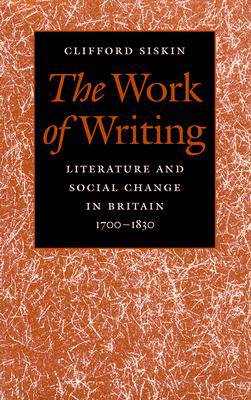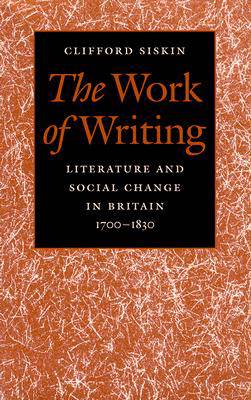
- Retrait gratuit dans votre magasin Club
- 7.000.000 titres dans notre catalogue
- Payer en toute sécurité
- Toujours un magasin près de chez vous
- Retrait gratuit dans votre magasin Club
- 7.000.0000 titres dans notre catalogue
- Payer en toute sécurité
- Toujours un magasin près de chez vous
The Work of Writing
Literature and Social Change in Britain, 1700-1830
Clifford SiskinDescription
"This book, like Siskin's first book, will be talked about, quoted, and used, both inside and outside the discipline. Its thesis is, by itself, worth the price of admission."--Kurt Heinzelman, University of Texas at Austin
As today's new technologies challenge the reign of writing, Clifford Siskin puts our current concerns about such change into history. In the 18th and early 19th centuries in Britain, he argues, the "new" technology was writing itself. How did its proliferation--in print and through silent reading--coalesce into the dominant forms of literary modernity, and with what consequences?
What changed, strikingly and fundamentally, were ways of knowing and of working. Admonitions against young women reading novels were not merely matters of Augustan conservatism but signals of those shifts: they warned against the capacity of the technology to change those who used it. Despite such caution, Britain saw, between 1700 and 1830, the advent of both modern disciplinarity and modern professionalism. These new divisions of knowledge and of labor were the work of writing, as was the engendering, at their intersection, of the discipline that took writing itself as its professional work--Literature.
Spécifications
Parties prenantes
- Auteur(s) :
- Editeur:
Contenu
- Nombre de pages :
- 296
- Langue:
- Anglais
Caractéristiques
- EAN:
- 9780801862847
- Date de parution :
- 26-11-99
- Format:
- Livre broché
- Format numérique:
- Trade paperback (VS)
- Dimensions :
- 141 mm x 220 mm
- Poids :
- 353 g

Les avis
Nous publions uniquement les avis qui respectent les conditions requises. Consultez nos conditions pour les avis.






